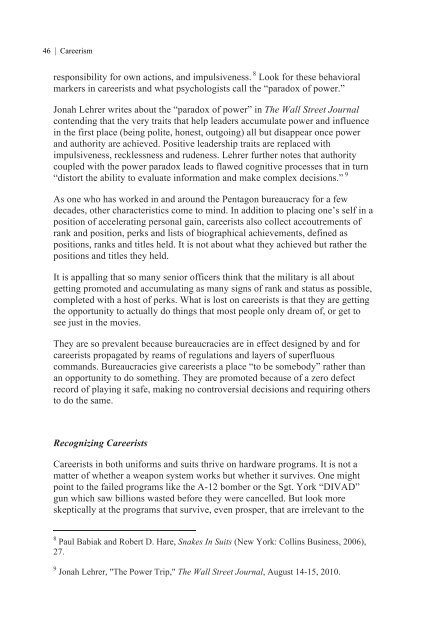The Pentagon Labyrinth
The Pentagon Labyrinth
The Pentagon Labyrinth
Create successful ePaper yourself
Turn your PDF publications into a flip-book with our unique Google optimized e-Paper software.
46 | Careerism<br />
responsibility for own actions, and impulsiveness. 8 Look for these behavioral<br />
markers in careerists and what psychologists call the “paradox of power.”<br />
Jonah Lehrer writes about the “paradox of power” in <strong>The</strong> Wall Street Journal<br />
contending that the very traits that help leaders accumulate power and influence<br />
in the first place (being polite, honest, outgoing) all but disappear once power<br />
and authority are achieved. Positive leadership traits are replaced with<br />
impulsiveness, recklessness and rudeness. Lehrer further notes that authority<br />
coupled with the power paradox leads to flawed cognitive processes that in turn<br />
“distort the ability to evaluate information and make complex decisions.” 9<br />
As one who has worked in and around the <strong>Pentagon</strong> bureaucracy for a few<br />
decades, other characteristics come to mind. In addition to placing one’s self in a<br />
position of accelerating personal gain, careerists also collect accoutrements of<br />
rank and position, perks and lists of biographical achievements, defined as<br />
positions, ranks and titles held. It is not about what they achieved but rather the<br />
positions and titles they held.<br />
It is appalling that so many senior officers think that the military is all about<br />
getting promoted and accumulating as many signs of rank and status as possible,<br />
completed with a host of perks. What is lost on careerists is that they are getting<br />
the opportunity to actually do things that most people only dream of, or get to<br />
see just in the movies.<br />
<strong>The</strong>y are so prevalent because bureaucracies are in effect designed by and for<br />
careerists propagated by reams of regulations and layers of superfluous<br />
commands. Bureaucracies give careerists a place “to be somebody” rather than<br />
an opportunity to do something. <strong>The</strong>y are promoted because of a zero defect<br />
record of playing it safe, making no controversial decisions and requiring others<br />
to do the same.<br />
Recognizing Careerists<br />
Careerists in both uniforms and suits thrive on hardware programs. It is not a<br />
matter of whether a weapon system works but whether it survives. One might<br />
point to the failed programs like the A-12 bomber or the Sgt. York “DIVAD”<br />
gun which saw billions wasted before they were cancelled. But look more<br />
skeptically at the programs that survive, even prosper, that are irrelevant to the<br />
8 Paul Babiak and Robert D. Hare, Snakes In Suits (New York: Collins Business, 2006),<br />
27.<br />
9 Jonah Lehrer, "<strong>The</strong> Power Trip," <strong>The</strong> Wall Street Journal, August 14-15, 2010.

















